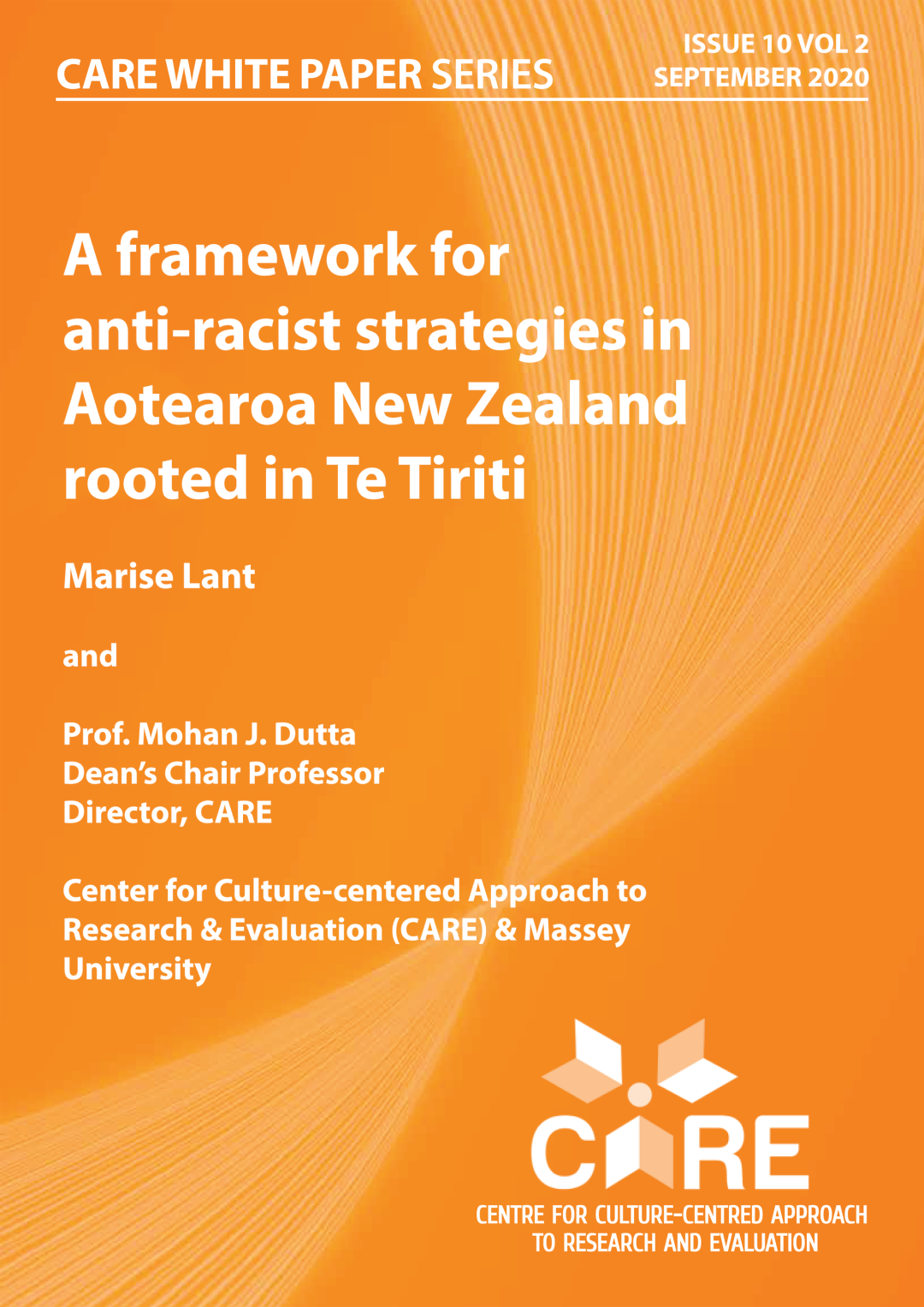by Marise Lant and Mohan J. Dutta, Center for Culture – Centered Approach to Research & Evaluation, Massey University

In this white paper [1], we outline the vitality of connecting across cultures, anchored in Māori leadership in shaping and guiding anti-racist interventions in Aotearoa New Zealand, connected to anti-colonial struggles by Māori. Noting that the entrenched settler colonialism in New Zealand is based on a history of Whiteness[2], we argue that witnessing this Whiteness in the colonial configuration of New Zealand is the first step to dismantling it[3]. Māori have historically experienced, negotiated and resisted the racist structures of Whiteness that form the architectures of settler colonialism in New Zealand through their everyday organizing across whanau and hapū. We center Whiteness to the colonial structures of racism in New Zealand because of the centering of White norms as the basis for perpetuating oppression, expulsion, genocide, rape, and murder of indigenous communities (Māori in New Zealand) and the simultaneous marginalisation of communities of colour, many of whom have experienced similar histories of expulsion, genocide, and violence.
In this paper, we argue that recognizing and centering the leadership of Māori as people of the land lies at the heart of the process of cultural centering we discuss here, anchoring interventions seeking transformations in racist structures in the everyday lived experiences of the indigenous people of the land. The leadership of Māori is vital to anti racist struggles not only as a way for building strategies that work but more fundamentally as the basis for turning to Te Tiriti. At the same time, connecting with the struggles of communities of colour, migrants and refugees in Aotearoa New Zealand creates a framework of solidarity that sees the Whiteness percolating through racist structures, witnesses the connections between them, and seeks to decolonize them. We argue here that seeing the connections between and across indigenous, ethnic, migrant and refugee struggles is central to culture-centered strategies of anti-racism that seek to dismantle Whiteness in colonial organisations, institutions, and society.
[1] We note in the naming of the white papers as authorial sources of knowledge the logics of Whiteness that constructs it.
[2] Whiteness refers to the hegemonic values of the colonising white culture, established as universal. See Moreton-Robinson, A. (2015). The white possessive: Property, power, and indigenous sovereignty. U of Minnesota Press
[3] Here we note the ongoing efforts at silencing conversations on Whiteness in Aotearoa by both white liberals and white supremacists. While white liberals suggest that the concept of Whiteness does not apply to Aotearoa, white supremacists deploy the age-old strategy of using communicative inversion by labelling anti-racist critiques of Whiteness as racist toward white communities.
Link to the CARE White Paper Launch with Marise Lant and Professor Mohan J Dutta.
Read More about Marise Lant’s Activist In Residence Events on Challenging Racism In Aotearoa New Zealand below:
Event Dates: 24th – 28th August 2020.
Location: Manawatū campus, Massey University
Events:
TUE 25 AUG – 6PM – A CONVERSATION WITH MARISE LANT
Venue: Online – via Facebook: @CAREMassey/videos & YouTube
THU 27 AUG – 11AM – CARE WORKSHOP
Venue: CARE Lab | BSC1.06 | Manawatū campus, Massey University
Speaker Bio:
Marise Lant is a Māori leader; Lobbyist,an Indigenous rights protector; Founder of 250 Years of Colonisation – The Aftermath leading the protest and burning of the Union Jack in opposition and response to the arrival of the year replica of Endeavour to Gisborne on 8 October 2019;Previous chairperson of the Tairāwhiti District Māori Womens Welfare League; Current representative on the Tairāwhiti District Māori Council;Supporter of the Tairāwhiti Multicultural Council.
FOR MORE DETAILS FOLLOW US on: @CAREMassey or visit www.massey.ac.nz/care and YouTube: @CAREMassey
#CAREMassey #ActivistInResidence #ChallengingRacismInAotearoa #NewZealand #MasseyCJM #MasseyUni
